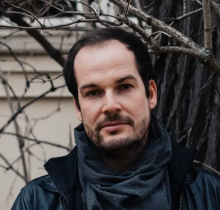On Friday April 12, the Berlin-based German Jewish writer Max Czollek gave an attention-grabbing talk, "Memorials Won't Help Us Now! Memory Culture and the Rise of the Radical Right in Germany.” The talk, organized by Rafael Balling and Jason Groves with additional support from the Simpson Center for the Humanities and the Stroum Center for Jewish Studies, was one of the most well-attended departmental talks in recent memory. Czollek’s talk, which was a preview of a new piece of public writing, discussed the promises and shortcomings of Germany’s much-touted memory culture, in which the nation is said to have thoroughly accounted for Nazi crimes through practices of public commemoration. Casting doubt on both the motives behind these commemorative acts and their effectiveness in light of the rising popularity of the ultra-right AfD political party, Czollek offered a sobering account of contemporary political and cultural life in Germany. While the talk did not resolve the question of what will help “us,” by which he understood all minoritized communities in Germany, he closed the talk with an appeal to literature, and poetry in particular, as an art form that gives voice to grief and inconsolability. Grief, Czollek suggests, helps us to organize the present in a way that can prevent the past from repeating itself.
Here are some recent articles in U.S. media by and about Czollek:
NYTimes: In Germany, a Jewish Millennial Argues That the Past Isn’t Past
The Nation: Germany’s Theater of Memory: “Some People Already See the Flames. Others Don’t Even Smell the Smoke.”
At the spring quarter edition of the departmental seminar we discussed a poem by Max Czollek. While Max's talk focused on his essayistic work on cultures of remembrance in Germany today, we spent some time with his poetry, too, and used our departmental seminar to discuss one of his poems, "von der wiederkehr"/ "of return", together. Max's poems explore Germany's painful continuities with a National-socialist past, pulsating beneath the surface of day-to-day life, but also the need for new solidarities, and the potentials of radical diversity.
You can read the poem in English and/or German and a short intro to Max's work here.
Jason Groves
